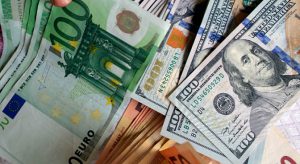Bloomberg
The euro surged the most in six months against the dollar as European Central Bank (ECB) policy makers underlined the need for further interest-rate hikes and as an anticipated slowdown in US inflation cooled the rampant demand for greenbacks.
The common currency rose as much as 1.6% to $1.0198, its biggest increase since March,
lent support by more hawkish rhetoric from ECB officials
such as Bundesbank President Joachim Nagel, who said the central bank must take further steps if the inflation picture stays the same. The ECB raised its key rate by an unprecedented 75 basis points last week to curb the fastest pace of consumer-price growth on record.
Investors are also moving to cover positions ahead of the US CPI report, with Bloomberg’s gauge of the greenback’s strength falling to its weakest level in almost two weeks. US price growth is expected to have slowed in August, according to a Bloomberg survey of economists, which could potentially reduce the need for more aggressive Federal Reserve interest-rate hikes that have supported the dollar.
“We are clearly in a mini-correction phase in the dollar at the moment, largely triggered by the recovery in risk sentiment and some unwinding of stretched long dollar positions,†said Francesco Pesole, currency strategist at ING Groep NV.
The market has been resolutely bearish on the euro’s outlook as Russia continues to curb gas supplies to the region, stoking inflation and increasing the prospect of a recession. The ECB has trailed the Federal Reserve in tightening policy against the backdrop, contributing to the euro’s slide to a two-decade low this year.
With that backdrop still largely unchanged, it may be difficult to argue that this marks a definitive change in fortunes for the battered common currency. The euro pared some gains, trading at $1.0136 in London.
“There’s been some degree of covering as the discussion of the ECB rate-hike continues, but I’m not convinced that this is a start of an uptrend at this stage,†said Steven Barrow, head of G-10 strategy at Standard Bank.
Investors have only been this short the common currency five times in the last two decades, according to custody data from Bank of New York Mellon. Still, while this reflects the gloomy outlook, it’s also making investors wary of adding to these positions.
The euro also extended gains against the pound, rising at one point to its highest since February 2021 at 87.22 pence. Monday’s move caught market participants off guard, triggering stop losses and compounding
the common currency’s advance, according to two Europe-based traders.
 The Gulf Time Newspaper One of the finest business newspapers in the UAE brought to you by our professional writers and editors.
The Gulf Time Newspaper One of the finest business newspapers in the UAE brought to you by our professional writers and editors.
